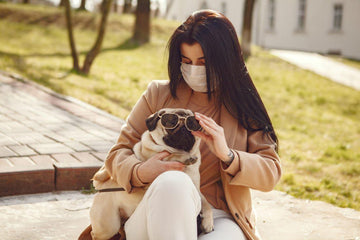
Summer is a wonderful time to be outdoors with your canine companion. The sunny weather, blooming flowers, and the smell of freshly cut grass create the perfect backdrop for playtime and long walks. But did you know that, much like humans, dogs can experience seasonal allergies, too? These allergies not only dampen the mood but can also result in significant discomfort to your dog. Understanding how to recognize and manage these allergies is crucial in keeping your pet happy and healthy throughout the summer months.
Key Takeaways
- Like humans, dogs can suffer from seasonal allergies caused by environmental factors, such as pollen. Symptoms include red, inflamed skin, excessive shedding, and respiratory issues, causing significant discomfort.
- Treatment includes flea and tick prevention, allergy shots, topical treatments, regular baths, and fatty acid supplements. It's essential to consult a veterinarian for a proper diagnosis and to rule out other skin conditions.
- Gotta Go Grass® pads for dogs offer a practical solution for managing your dog's exposure to outdoor allergens. They are a convenient indoor bathroom alternative, particularly on high-pollen days. Natural, versatile, and long-lasting, our grass pads can help keep your pet comfortable and healthy during allergy season.
What are Seasonal Allergies in Dogs?
Dogs can be allergic to a variety of things in their environment. In addition to chemicals, mold, and cigarette smoke, they can display seasonal allergies, reacting to airborne allergens that are more prevalent during certain times of the year. Plant and tree pollen, for example, are widespread from spring through fall. During these times, it may help to limit outdoor activities, particularly on high-pollen days, to manage symptoms. As pet parents, setting up a grass pad for dogs can provide a convenient indoor bathroom alternative, ensuring your pet has a safe space to relieve itself without exposing it to high levels of allergens.

Signs of Seasonal Allergies in Dogs
Both humans and pets with seasonal allergies have immune systems hypersensitive to specific allergens in the environment. When these allergens reach high levels, the immune system reacts, leading to an allergic response and symptoms. While humans with seasonal allergies often have itchy eyes, a runny or stuffy nose, and a scratchy throat, dogs experience different symptoms, primarily through their skin. These symptoms can be just as problematic for them. Common dog allergy symptoms include:
- Red, inflamed, or infected skin
- Crusting or thickening of the skin, also called elephant skin
- Watery eyes
- Excessive shedding
- Chronic ear infections or red, waxy ears
- Respiratory issues such as coughing or difficulty breathing
Dogs with a skin infection or itchy, irritated skin may compulsively lick their paws, scoot their bottoms, or excessively scratch and bite their coat or skin. The most commonly affected areas are the ears, mouth, limbs, armpits, abdomen, groin, tail, and around the eyes.
Diagnosing Seasonal Allergies in Dogs
Seasonal allergies differ from year-round environmental allergies and food allergies in dogs because symptoms occur only during specific times of the year. This depends on what your dog may be allergic to and when such specific seasonal allergens are prevalent. This is in contrast with dogs experiencing skin issues year-round.
Dogs with seasonal allergies may be itchy in specific areas, such as their paws, or all over. They can also have recurring ear and skin infections when exposed to environmental allergens at certain times of the year. Consulting your dog's veterinarian for a physical exam is essential for a proper diagnosis and to rule out other skin conditions that may cause similar symptoms, such as food allergies, dust mites, or fleas.

6 Tips to Manage and Treat Seasonal Allergies in Dogs
Seasonal allergies are a chronic condition with no treatment, but there are ways to treat and manage symptoms to keep your dog comfortable.
Year-Round Flea and Tick Prevention
Fleas and ticks can exacerbate allergic reactions and skin issues in dogs. Regular treatments to prevent infestations can help reduce the severity of your dog's symptoms.
Allergy Shots and Topical Treatments
These allergy treatments can provide temporary relief from all that itching and scratching. For topical treatments, ensure the products are made specifically for pets, as those formulated for humans may be toxic or ineffective for your pet.
Baths
Regular baths can help remove allergens from your pet's coat, avoiding allergic reactions and soothing irritated skin. Use dog shampoos with oatmeal, which helps moisturize the skin, ease itching, and reduce inflammation.
Fatty Acid Supplements
The omega fatty acids in many fish oil supplements help relieve itchy skin and prevent skin infections. These supplements also help strengthen and protect your dog's skin barrier and soften their coat.
Avoid Allergens
The best way to relieve symptoms is to reduce exposure to allergens. This may be challenging, as it's hard not to take your dog outside. However, limiting time outdoors, particularly on high-pollen days, will help manage symptoms. Gotta Go Grass® can be an excellent solution here, providing a natural and convenient alternative to outdoor potty breaks.
Wipe Off Coats and Paws
When outdoor trips are unavoidable, wiping down your pet’s coat, skin, and paws each time you return can help remove excess pollen and allergens. This is particularly helpful if the irritation is localized to their paws.

Managing your dog's seasonal allergies is essential for their comfort and health. Our indoor grass potty pads for dogs offer a natural, versatile, and long-lasting solution to avoid exposure to environmental allergens. You can place them indoors or outdoors, on the patio or balcony, providing a convenient bathroom alternative with natural moisture and odor-absorbing properties.
By understanding and managing your dog's seasonal allergies, you can ensure a happier, healthier summer for your furry friend.




